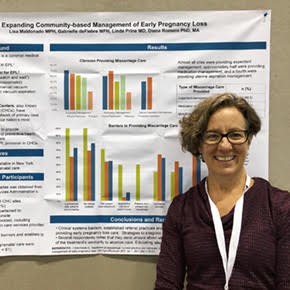Ongoing RHAP Research Report

This past year, we have focused on expanding our research and evaluation efforts to improve our programs while simultaneously continuing to support several ongoing research projects that help contribute to our mission and work.
One of our longest, ongoing research projects has helped build our Reproductive Health Access Network. Every spring, we conduct a survey of graduating family medicine residents who attended programs that provide training in abortion care. We ask if they received training in several reproductive health services, such as IUD insertions and aspiration abortion, and whether they plan to provide this care. We also give them the opportunity to join our Reproductive Health Access Network where they can receive support from physicians in their area who are providing reproductive health care. While this annual survey was initially designed to help us identify and support future abortion providers, it has also provided us with interesting information on reproductive health training and perceived barriers to providing care. Early in 2015 we published the results of the first four years of the study in the journal Family Medicine.
Last year, we sent a survey to all the federally qualified health centers in New York State to learn about the reproductive health care they provide. We presented the results of the survey at the American Public Health Association Meeting in November and plan to write a paper about our findings.
This summer we focused on evaluating our Reproductive Health Care and Advocacy Fellowship program. We conducted in-depth interviews with all our former fellows in the hopes of learning how the fellowship prepared them to provide and teach reproductive health care. This January, we are launching an evaluation of our Miscarriage Care Initiative to assess the full impact of the training and support we offer our grantees. We want to better understand how integrating miscarriage care into their practices improves reproductive health care, overall, and how we can improve the program to meet the needs of future grantees. Lastly, this summer we will conduct an evaluation of our Hands-on Reproductive Health Training Center where we train primary care clinicians how to insert and remove IUDs and contraceptive implants.
Our research helps us understand the landscape of reproductive health in this country and our evaluation projects help us measure our impact and improve our programs. We look forward to sharing the results of these efforts with you soon!
